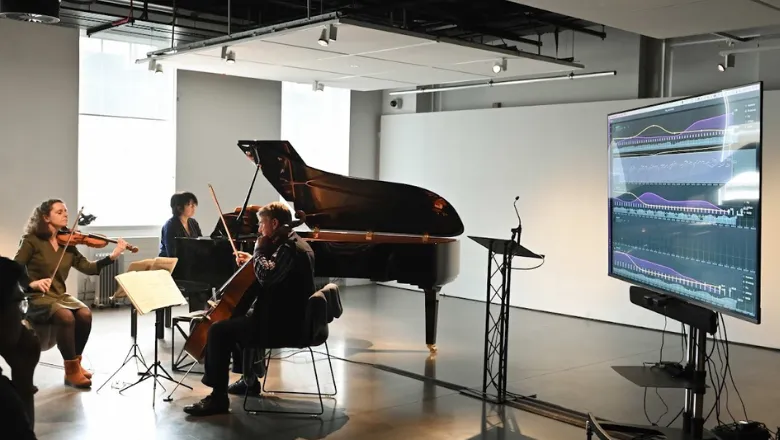
Professor Elaine Chew PhD, FTCL, LTCL, BAS
Professor of Engineering
Research interests
- Computer science
- Mathematics
- Medicine
- Music
Pronouns
she/her
Biography
Elaine Chew is Professor of Engineering joint between the Department of Engineering (Faculty of Natural, Mathematical & Engineering Sciences) and the Department of Cardiovascular Imaging in the School of Biomedical Engineering & Imaging Sciences (Faculty of Life Sciences & Medicine) at King's College London.
An operations researcher and pianist by training, Elaine is a leading authority in music representation, music information research (MIR), and music perception and cognition, and an established performer. A pioneering researcher in MIR, she is forging new paths at the intersection of music and cardiovascular science. Her research focuses on the mathematical and computational modelling of musical structures in music and in electrocardiographic traces, with application to music-heart-brain interaction and computational arrhythmia research. She is Principal Investigator of the European Research Council (ERC) Advanced Grant COSMOS (Computational Shaping and Modeling of Musical Structures) and Proof of Concept HEART.FM (Maximizing the Therapeutic Potential of Music through Tailored Therapy with Physiological Feedback in Cardiovascular Disease), using data/citizen science techniques to decipher the functions and mechanisms of music expressivity and deploying them for autonomic modulation.
Personal homepage: https://eniale.kcl.ac.uk
Research

Data-Centric Engineering
Applying machine learning to engineering challenges

Signals & Control
Applying signal processing and control to generate adaptive intelligent systems.

Music Computing Lab
Computational approaches to creating and understanding music at King's College London.
News
Scientists predict how playing music affects musicians' heart rates
Music can be heartfelt – literally it seems – as scientists have found a way to predict how playing music affects a musician's heart.

King's scientist wins prestigious Falling Walls Science Breakthrough of the Year award
Professor Elaine Chew has received the award for her groundbreaking work on music’s role in cardiovascular health

Professor Elaine Chew welcomed to King's Engineering
Professor Chew is warmly welcomed by both Faculty of Natural, Mathematical & Engineering Sciences and the Faculty of Life Sciences & Medicine

Events

Engineering Inaugural Lecture: Professor Elaine Chew
Join us to celebrate our professors and hear about their inspiring career journeys.
Please note: this event has passed.
Research

Data-Centric Engineering
Applying machine learning to engineering challenges

Signals & Control
Applying signal processing and control to generate adaptive intelligent systems.

Music Computing Lab
Computational approaches to creating and understanding music at King's College London.
News
Scientists predict how playing music affects musicians' heart rates
Music can be heartfelt – literally it seems – as scientists have found a way to predict how playing music affects a musician's heart.

King's scientist wins prestigious Falling Walls Science Breakthrough of the Year award
Professor Elaine Chew has received the award for her groundbreaking work on music’s role in cardiovascular health

Professor Elaine Chew welcomed to King's Engineering
Professor Chew is warmly welcomed by both Faculty of Natural, Mathematical & Engineering Sciences and the Faculty of Life Sciences & Medicine

Events

Engineering Inaugural Lecture: Professor Elaine Chew
Join us to celebrate our professors and hear about their inspiring career journeys.
Please note: this event has passed.
